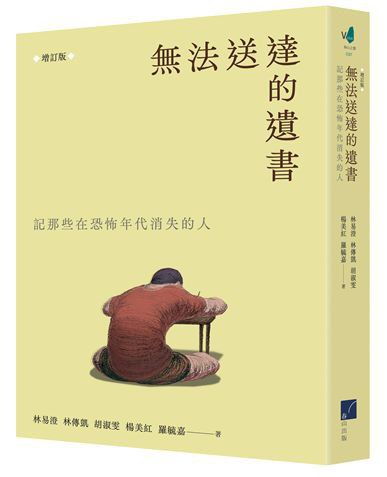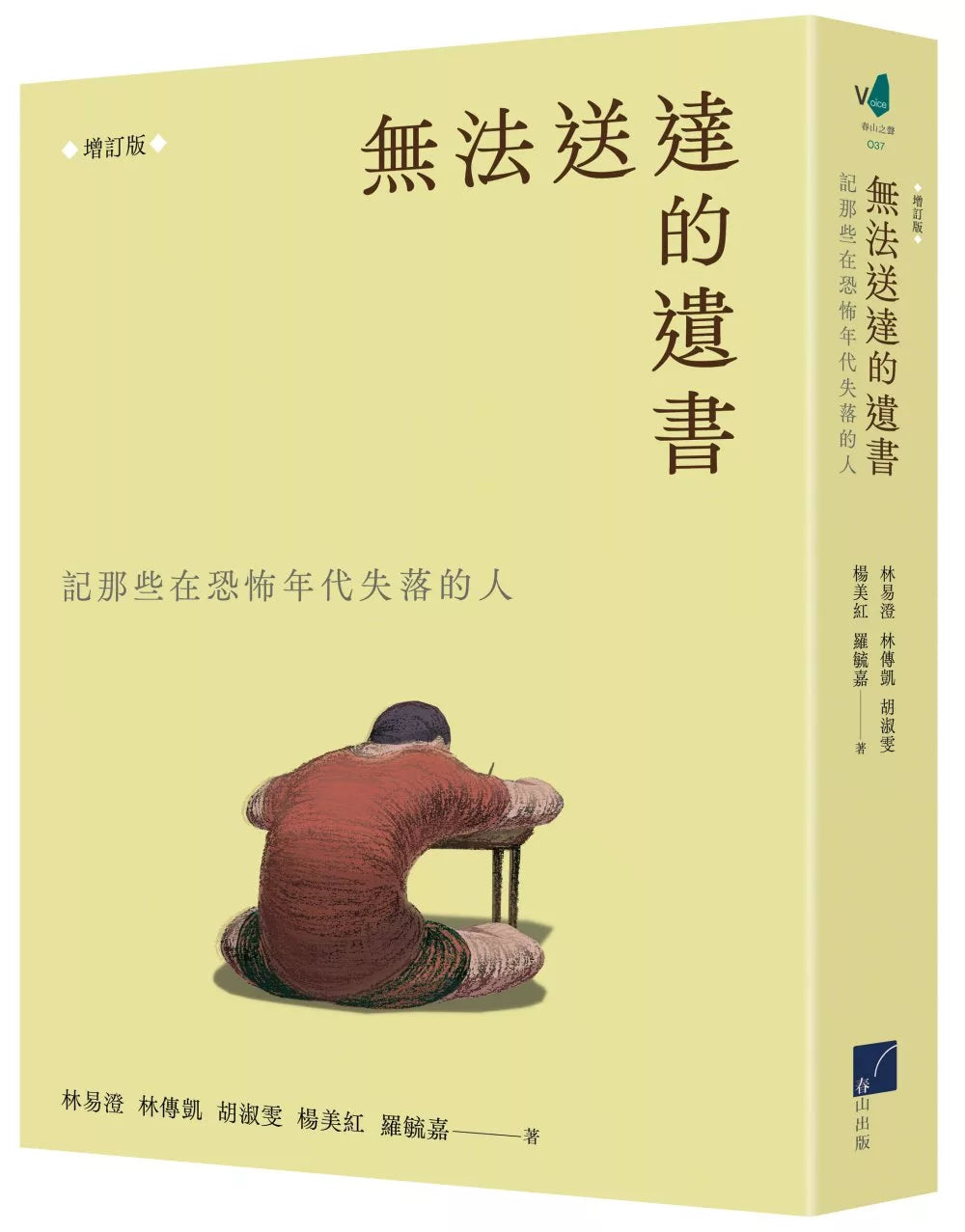1
/
of
2
Undeliverable Suicide Notes: Remembering Those Lost in the Age of Terror (Revised Edition)
Undeliverable Suicide Notes: Remembering Those Lost in the Age of Terror (Revised Edition)
Lin Yicheng , Lin Chuankai , Hu Shuwen , Yang Meihong , Luo Yujia
Regular price
$29.99 USD
Regular price
Sale price
$29.99 USD
Unit price
/
per
Low stock
Couldn't load pickup availability
About Book
About Book
The suicide note is silent, but it is the only material we have.
Let us rediscover the details lost in time and continue this struggle between memory and forgetfulness.
The revised edition includes the story of political victim Wang Wenpei and his father Wang Daming, as well as a comprehensive analysis of their suicide note. (White Gallery)
It's already past twelve o'clock. In six o'clock, I will become a bloody corpse.
Even though it was just over twenty years, it was like a dream that vanished cleanly. But your son Xingsheng did indeed live in the 20th century and died on June 17, 1952. He was also happy, suffered, worked hard, and at least made a difference in the world. — Qiu Xingsheng's suicide note in 1952
I am leaving, and I feel no pain at all. Instead, I feel quite optimistic. Life is short, like a meteor that flashes and disappears in an instant, not worth cherishing. However, I have left some fruits for the future, and this is enough to comfort me. —Wang Wenpei's suicide note in 1953
The suicide notes of political victims, which had been silent for decades, have finally been unearthed from the cold national archives. The writers of the letters were forced to leave this world, and the recipients also passed away before they could receive the letters.
In 2008, the granddaughter of a political victim accidentally discovered the suicide notes of an executed family member in national archives, sparking a series of "letter return" campaigns. At least 906 pages of documents written by 208 victims were sealed in government agencies. Their families had never known of their existence, only that their cherished loved ones had been forced to leave this world prematurely. The "recipients" were filled with confusion, bewilderment, grief, and resentment... and walked alone for decades amid the White Terror's murderous rampage.
These "letter writers" were young men executed in the 1950s and 1970s. Some were members of the "underground party" who embraced socialist ideals, while others were revolutionaries advocating for Taiwanese independence. Their differing ideologies led to the same path of resistance and death. They included Guo Qing, Huang Wengong, Liu Yaoting, Zeng Jintang, Wang Wenpei, and those involved in the Taiyuan Incident: Zheng Jinhe, Chen Liang, Zhan Tianzeng, Xie Dongrong, and Jiang Bingxing. They need not be hailed as heroes by future generations, but they can serve as a torch for future generations to confront and reflect on history.
Through interviews with family members, historical research, and archival studies, the five authors reconstruct the White Terror's history as told in suicide notes, and the profound impact it had on their families' subsequent lives. In addition to text, the book also includes precious images, including suicide notes, letters, and family albums. This revised edition also includes scholar Lin Chuankai's account of the life of Wang Wenpei, a political victim executed in 1953, and his father, Wang Daming, as well as a comprehensive analysis of over thirty suicide notes.
Recommended by all parties
Recommended by Qiu Yanliang, Ji Ji, Chen Lie, Tang Xiangyan, and Zhang Zezhou
I recommend this book to readers not because I want them to bear the burden or grief of their ancestors' final words, which their families were unable to read, more than half a century later. Rather, I hope that we, the descendants, can empathize with the reality of those who, before their execution, knew their "suicide notes" were likely unseen by their families and might never see the world, yet they were compelled to express their will. This is inspired by my own experience in Jingmei Prison, where letters to my loved ones were never received. —Qiu Yanliang (Adjunct Associate Professor, Indigenous Studies Program, College of Design, Chung Yuan Christian University, and Department of Psychology, Fu Jen Catholic University)
Ever since I started attending Yongding National School in 1950, the stories of suffering of my fellow countrymen and their families have accompanied me through doubt, fear, and growth. Even after growing up and leaving home, even now that I am old, their stories have never faded from my memory; not even for a single day. —Ji Ji (author)
These life stories, and the writings of these authors, transcend the seemingly archival and research-driven writings that uniquely and vividly enhance our understanding and feelings about this recent past. —Chen Lie (author)
The book's cautious and measured choice of words, and its reluctance to fall prey to subjective speculation, are admirable. Although this is only a narrative account of a few victims, I highly recommend it to readers, especially the younger generation, who should understand the truth about this important period of Taiwanese history half a century ago. —Zhang Zezhou (Director of Banqiao Community College and Adjunct Professor of the Department of Agricultural Chemistry at National Taiwan University)
Those lost during the Age of Terror seem to exist in a void, yet they certainly once existed. The meaning of their existence may gradually become apparent. Through ever-deeper efforts, those of our generation may be able to compose a requiem for them. — Tang Xiangyan (author)
Let us rediscover the details lost in time and continue this struggle between memory and forgetfulness.
The revised edition includes the story of political victim Wang Wenpei and his father Wang Daming, as well as a comprehensive analysis of their suicide note. (White Gallery)
It's already past twelve o'clock. In six o'clock, I will become a bloody corpse.
Even though it was just over twenty years, it was like a dream that vanished cleanly. But your son Xingsheng did indeed live in the 20th century and died on June 17, 1952. He was also happy, suffered, worked hard, and at least made a difference in the world. — Qiu Xingsheng's suicide note in 1952
I am leaving, and I feel no pain at all. Instead, I feel quite optimistic. Life is short, like a meteor that flashes and disappears in an instant, not worth cherishing. However, I have left some fruits for the future, and this is enough to comfort me. —Wang Wenpei's suicide note in 1953
The suicide notes of political victims, which had been silent for decades, have finally been unearthed from the cold national archives. The writers of the letters were forced to leave this world, and the recipients also passed away before they could receive the letters.
In 2008, the granddaughter of a political victim accidentally discovered the suicide notes of an executed family member in national archives, sparking a series of "letter return" campaigns. At least 906 pages of documents written by 208 victims were sealed in government agencies. Their families had never known of their existence, only that their cherished loved ones had been forced to leave this world prematurely. The "recipients" were filled with confusion, bewilderment, grief, and resentment... and walked alone for decades amid the White Terror's murderous rampage.
These "letter writers" were young men executed in the 1950s and 1970s. Some were members of the "underground party" who embraced socialist ideals, while others were revolutionaries advocating for Taiwanese independence. Their differing ideologies led to the same path of resistance and death. They included Guo Qing, Huang Wengong, Liu Yaoting, Zeng Jintang, Wang Wenpei, and those involved in the Taiyuan Incident: Zheng Jinhe, Chen Liang, Zhan Tianzeng, Xie Dongrong, and Jiang Bingxing. They need not be hailed as heroes by future generations, but they can serve as a torch for future generations to confront and reflect on history.
Through interviews with family members, historical research, and archival studies, the five authors reconstruct the White Terror's history as told in suicide notes, and the profound impact it had on their families' subsequent lives. In addition to text, the book also includes precious images, including suicide notes, letters, and family albums. This revised edition also includes scholar Lin Chuankai's account of the life of Wang Wenpei, a political victim executed in 1953, and his father, Wang Daming, as well as a comprehensive analysis of over thirty suicide notes.
Recommended by all parties
Recommended by Qiu Yanliang, Ji Ji, Chen Lie, Tang Xiangyan, and Zhang Zezhou
I recommend this book to readers not because I want them to bear the burden or grief of their ancestors' final words, which their families were unable to read, more than half a century later. Rather, I hope that we, the descendants, can empathize with the reality of those who, before their execution, knew their "suicide notes" were likely unseen by their families and might never see the world, yet they were compelled to express their will. This is inspired by my own experience in Jingmei Prison, where letters to my loved ones were never received. —Qiu Yanliang (Adjunct Associate Professor, Indigenous Studies Program, College of Design, Chung Yuan Christian University, and Department of Psychology, Fu Jen Catholic University)
Ever since I started attending Yongding National School in 1950, the stories of suffering of my fellow countrymen and their families have accompanied me through doubt, fear, and growth. Even after growing up and leaving home, even now that I am old, their stories have never faded from my memory; not even for a single day. —Ji Ji (author)
These life stories, and the writings of these authors, transcend the seemingly archival and research-driven writings that uniquely and vividly enhance our understanding and feelings about this recent past. —Chen Lie (author)
The book's cautious and measured choice of words, and its reluctance to fall prey to subjective speculation, are admirable. Although this is only a narrative account of a few victims, I highly recommend it to readers, especially the younger generation, who should understand the truth about this important period of Taiwanese history half a century ago. —Zhang Zezhou (Director of Banqiao Community College and Adjunct Professor of the Department of Agricultural Chemistry at National Taiwan University)
Those lost during the Age of Terror seem to exist in a void, yet they certainly once existed. The meaning of their existence may gradually become apparent. Through ever-deeper efforts, those of our generation may be able to compose a requiem for them. — Tang Xiangyan (author)
Publication Date
Publication Date
2022-06-21
Publisher
Publisher
春山出版
Imprint
Imprint
Pages
Pages
464
ISBN
ISBN
9786269599141
share



